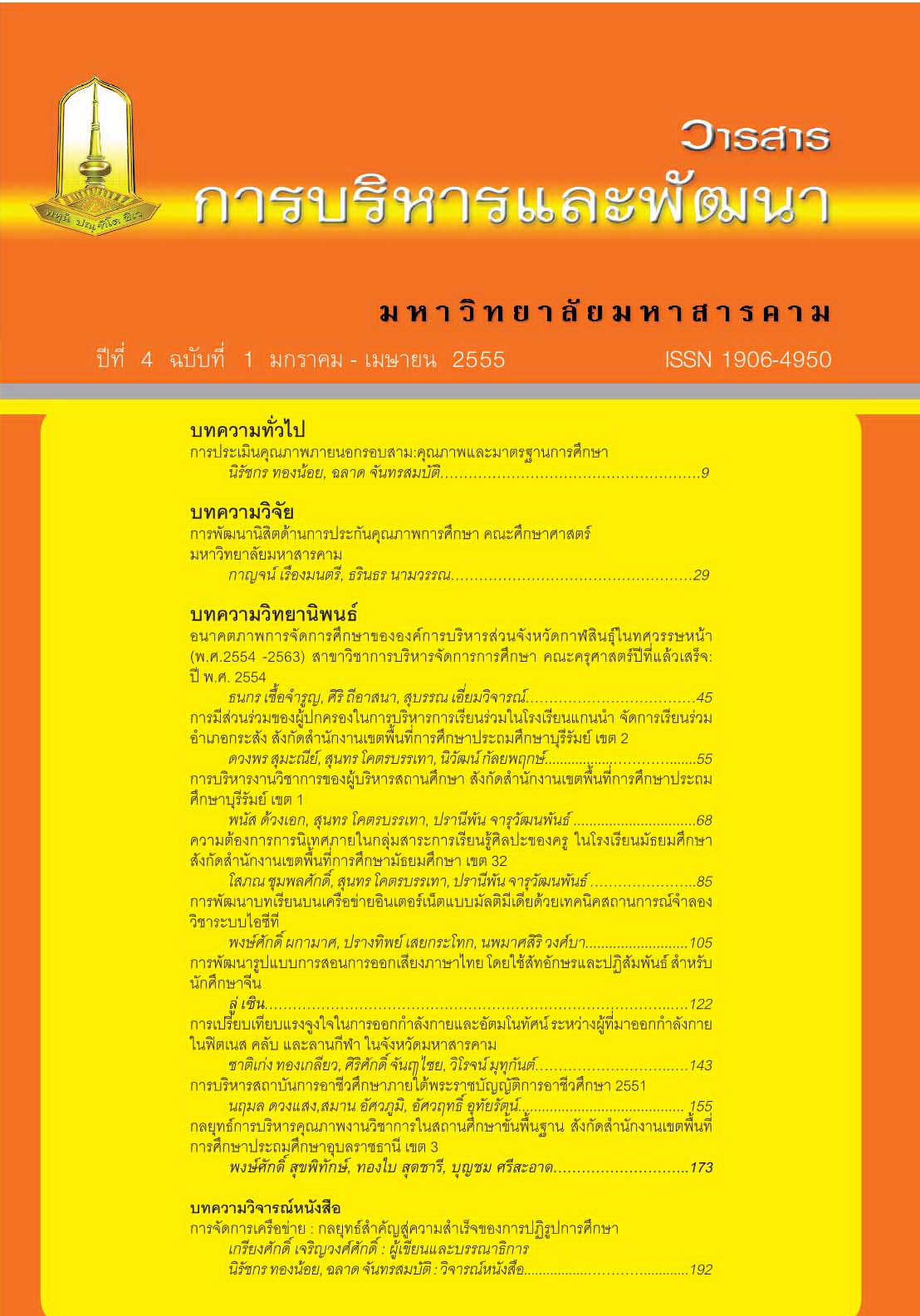อนาคตภาพการจัดการศึกษาขององค์การบริหารส่วนจังหวัดกาฬสินธุ์ในทศวรรษหน้า (พ.ศ.2554-2563)
Main Article Content
Abstract
บทคัดย่อ
การวิจัยครั้งนี้ มีวัตถุประสงค์เพื่อศึกษาและเสนออนาคตภาพที่เป็นไปได้ในการจัดการศึกษาขององค์การบริหารส่วนจังหวัดกาฬสินธุ์ ในทศวรรษหน้า (พ.ศ.2554-2563) โดยใช้การวิจัยอนาคตแบ่งขั้นตอนการวิจัยออกเป็น 3 ระยะ คือ ระยะที่ 1 การศึกษาแนวคิดทฤษฎีและความต้องการของท้องถิ่นที่มีต่อการกำหนดบทบาท ทิศทางการจัดการศึกษากลุ่ม เป้าหมาย ได้แก่ ผู้บริหารสถานศึกษา จำนวน 41 คน ผู้ทรงคุณวุฒิด้านการศึกษา จำนวน 21 คน ระยะที่ 2 การศึกษาอนาคตภาพการจัดการศึกษาที่เป็นไปได้ กลุ่มเป้าหมาย ได้แก่ กลุ่มผู้ทรงคุณวุฒิ 21 คน ระยะที่ 3 การทำประชาพิจารณ์เสนออนาคตภาพการจัดการศึกษาสู่นโยบายและแผนปฏิบัติกลุ่มเป้าหมายจำนวน 60 คน เครื่องมือที่ใช้ในการวิจัย ได้แก่ แบบ สัมภาษณ์กึ่งโครงสร้างแบบสอบถาม และแบบประชาพิจารณ์ สถิติที่ใช้ในการวิเคราะห์ข้อมูล ได้แก่มัธยมฐานพิสัยระหว่างควอไทล์และการวิเคราะห์เนื้อหาสำหรับข้อมูลเชิงคุณภาพ
ผลการวิจัยพบว่า อนาคตภาพที่เป็นไปได้ด้านการจัดการศึกษาขององค์การบริหาร ส่วนจังหวัดกาฬสินธุ์มี 11 ด้าน คือ 1. ด้านความเสมอภาคของโอกาสทางการศึกษาขั้นพื้น ฐาน จะมีรูปแบบการจัดการศึกษาสำหรับคนพิการ ผู้ทุพลภาพ ผู้ด้อยโอกาสผู้มีความสามารถ พิเศษ 2. ด้านคุณภาพมาตรฐานการศึกษาจะมีการจัดทำระบบการประกันคุณภาพการศึกษา ภายในโรงเรียนและการประเมินคุณภาพการศึกษาภายนอก 3. ด้านระบบบริหารและการ จัดการศึกษาจะมีการยกฐานะกองการศึกษา ศาสนา และวัฒนธรรมเป็นสำนักการศึกษา เพื่อการบริหารจัดการที่มีประสิทธิภาพ 4. ด้านครู อาจารย์และบุคลากรทางการศึกษา จะมี การวางแผนพัฒนาด้านครู บุคลากรทางการศึกษา 5. ด้านหลักสูตร จะมีการจัดทำหลักสูตร ทั้งระดับมัธยมศึกษาควบรวมกับอาชีวศึกษา มีการจัดงบประมาณ เพื่อจัดทำวิจัยและพัฒนา หลักสูตร 6. ด้านกระบวนการเรียนรู้จะมีการจัดการเรียนรู้ตลอดชีวิตทั้งในระบบ นอกระบบ และการศึกษาตามอัธยาศัยที่หลากหลายสอดคล้องกับธรรมชาติของวิชาและภูมิปัญญาท้อง ถิ่น 7. ด้านทรัพยากรและการลงทุนเพื่อการศึกษา จะมีการจัดสรรงบประมาณเพิ่มเติมจากที่ รฐั บาลจัดสรรและเปิดโอกาสใหโ้ รงเรียนเข้ามามีสว่ นร่วมในการนำเสนองบประมาณ 8.ด้าน เทคโนโลยีเพื่อการศึกษา จะมีศูนย์เทคโนโลยีเพื่อการผลิต วิจัย และพัฒนาเทคโนโลยีเพื่อการ ศึกษาในระดับสถานศึกษา 9. ด้านการส่งเสริมกีฬา นันทนาการและกิจกรรมเด็กและเยาวชน จะมีการจัดตั้ง ศูนย์นันทนาการและลานกีฬา เพื่อให้บริการนักเรียน ผู้ปกครองและชุมชน 10. ด้านการส่งเสริมอาชีพ จะมีการจัดทำหลักสูตรฝึกอาชีพระยะสั้นให้บริการแก่นักเรียนและ ประชาชนทั่วไป 11. ด้านการศาสนา ศิลปะ วัฒนธรรม จารีตประเพณีและภูมิปัญญาท้อง ถิ่นจะมีการจัดงบประมาณอุดหนุนเพื่อส่งเสริมให้ชุมชนและโรงเรียนจัดศูนย์การเรียนรู้ด้าน ศาสนา ศิลปะ วัฒนธรรม จารีตและประเพณี ภูมิปัญญาท้องถิ่นส่วนผลการประชาพิจารณ์ พบว่า ผู้เข้าร่วมประชาพิจารณ์เห็นด้วยกับกลุ่มผู้ทรงคุณวุฒิทุกประเด็น
Abstract
The objectives of this research were to study the educational management of Kalasin Provincial Administrative Organization and to propose a scenario in the next decade (2011-2020) using the future research method. The study was divided into three phases.
Phase 1: To study related theories and concepts as well as the needs of local communities concerning allocation of roles and directions of the educational management. The research participants were 41 educational institution administrators and 21 educational experts.
Phase 2: To study the possible scenario of educational management leading to policy and action plan. The research participants were 21 experts.
Phase 3: To conduct the public hearing of the scenario. The semi-structured interview, questionnaires, public hearing forms were used for data collection. The data were analyzed using modes and quartile-ranges. The content analysis was used for qualitative data.
The findings of this study revealed that the possible scenario of educational management of Kalasin Provincial Administrative Organization are divided into 11 parts ; 1) Equities in elementary education; educational management should cover education for all people: the disabilities, the disadvantages and the gifted students. 2) Educational standard; system of educational quality assurance and external quality evaluation of schools should be conducted. 3) Educational administration and management; Department of Education, Religion and Culture should be promoted to be the office of education for effective management. 4) Teachers and educational personnel; Professional development for teachers and educational personnel should be planned. 5) Curriculum; Cooperative plan of vocational and secondary school curriculum development including budget allocation for research and curriculum development should be considered. 6) Learning process; Educational management for lifelong learning both formal and non- formal education should be involved with varieties of subject areas related to local wisdom. 7) Resources and funding; Extra funding and school participation in budgeting should be enhanced. 8) Educational technology; Thecentre of technology and research development for education should be available in educational institutions. 9) Sports and recreational activities for children and youths; The establishment of recreation and sport center for community service should be supported. 10) Vocational and career promotion; Short course vocational curriculum for public should be developed. 11) Cultures, arts, religions and local wisdoms; Communities and schools should have financial support for creating learning center in cultures, arts, religions and local wisdoms. The results from the public hearing revealed that all participants had agreed on all itemsof the hearing.
Keywords : scenario, educational management, provincial administrative organization

